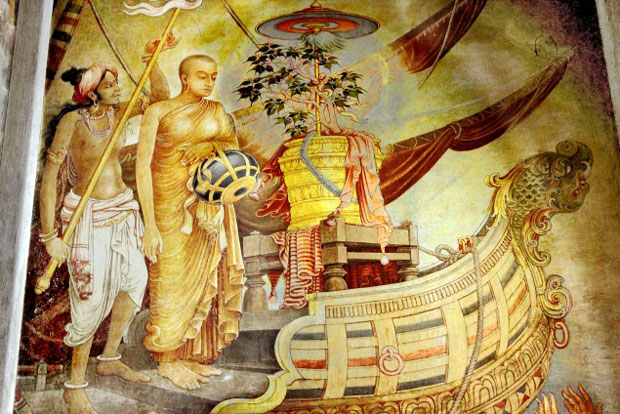Reply To:
Name - Reply Comment
Last Updated : 2024-04-26 21:39:00

 Unduvap is the last Full Moon day of the year and it commemorates the arrival of Sangamitta Therini with a Bo sapling from the Jaya Sri Maha Bodhi in India. She arrived in the port of Dambakola Patuna in the Northern-most point in the island after a seven-day journey from India.
Unduvap is the last Full Moon day of the year and it commemorates the arrival of Sangamitta Therini with a Bo sapling from the Jaya Sri Maha Bodhi in India. She arrived in the port of Dambakola Patuna in the Northern-most point in the island after a seven-day journey from India.
The sacred Bo sapling was brought here in a golden bowl, and it was planted in the Mahameuna Uyana in Anuradhapura. Saplings that emerged from it were taken to various parts of the island to spread the Buddha Dhamma and Buddhist culture. Visit by Sangamitta Therini was beneficial to us in many ways other than of bringing the Bo sapling. Her retinue included people skilled in different crafts and disciplines like woodwork, indigenous medicine, agriculture; they shared their expertise with the locals.
These skills have been handed down through generations and employed for the advancement of this nation. Arahat Mahinda’s arrival with his sister was a beginning of a new chapter in the history of Sri Lankan womanhood. It paved the way for a disciplined and a peaceful society. The art and architecture, construction of huge stupas and tanks began. The agricultural economy flourished in the island.
Buddhism tells us precisely and objectively what we are and what the world around us is, and explains us the way to perfect liberty, tranquillity, peace, and happiness.
Young good-looking, charming Sangamitta, entered the Bhikkuni Sasana at the age of 18 years.
Sangamitta, Arahat Mahinda Thera’s sister, appealed to King Dharmasoka, her father stating:
“Oh, Great King, the order of my brother is very important and the females who are to be ordained in Lanka are many—on that account, it is absolutely necessary that I should go there”
Sangamitta was only 32 years of age when she undertook this task. Anula Devi, who had already become a follower of the Dhamma along with King Devanam Piyatissa, wished to be ordained into the Nuns Order. Mahinda Thera informed his inability to do so, and he advised the King to send a message to Emperor and obtain the services of his sister Sangamitta Therini, to be deputed as her son a samanera, who had joined his uncle Mahinda’s mission was already in Sri Lanka. Earlier Arahat Mahinda arrived in Mihintale on Poson Poya day to spread Dhamma in the island of Sri Lanka. A request from the King of Lanka, Devanam Piyatissa, Asoka’s friend followed. He decided to send daughter Sangamitta with an entourage of ten learned Bhikkhuni, and craftsmen to Sri Lanka.
Mahavansa says, the King Devanam Piyatissa, with all pomp and pageantry, paying his highest respect and honour, wading neck deep into the ocean, received the golden bowl containing the Sri Maha Bodhi Sapling, which is respected to-date and honoured as the living Buddha.
The first Sri Lankan woman to be ordained as a Buddhist nun was princess Anula who was ordained by Sangamitta therini, who carried out the pabbajja ordination, which means ‘to go forth’, it is an instance of a person leaving abode to become a Bhikkhu; this generally involves introductory ordination as a novice monk. These great activities, exchange of gifts of Dhamma and relations between nations were possible mostly due to the consensual attitudes of the rulers that existed under monastic rulers in the ancient times.
More than 1,000 of Anula Devi’s companions were also bestowed with pabbajja ordination, which created the ‘first priestly life of the Bhikkuni Sasana’ in Sri Lanka. Her name became synonymous with ‘Female Monastic Order’ or Meheni Sasna of Theravāda that was recognized not only on this island but also in China, Burma, and Thailand.
Good Governance and economics of Dhamma
Buddhism does not abandon the material and worldly characteristics of life but considers saintly values are more sacred than material morals and standards. The scriptures set out certain standards of conduct for kings as well as subjects [rulers and people]. Buddha has spelt out his preference for a democratic form of governance while observing different types of governments existed at the time.
Dighajānu once told the Buddha:
“Sir, we are ordinary lay men, leading the family life with wife and children. Would the Blessed One teach us some doctrines which will be conducive to our happiness in this world and hereafter?’ The Buddha advised him on four things which are conductive to a man’s contentment in this samsara: number one; he should be efficient, skilled, energetic and earnest in whatever profession he is occupied, and he should know it thoroughly; second: he should look after his possession, which he has thus earned virtuously, with the sweat of his brow; third: he should have kalyāṇa-mitta or good friends who are learned, virtuous, faithful, liberal and intelligent, who will direct him along the correct path away from immorality; fourth: he should use up reasonably his expenses, in proportion to his returns— meaning he should live within his resources.
The pragmatic view Governance
Since the commencement of human development religion has been an important aspect of our society and culture. According to anthropologists, the main world religions started as the activities of enlightenment and revival for societies seeking more broad answers to their problems, though the beginning of religious thinking in our ancestors remain vague.
The easiest way to describe religion is to refer to it as a ‘belief in, or the reverence of a god. We have observed the religious groups establishing powerful and convincing inspirations in men by creating ideas of what is moral and what is considered immoral.
The religion has been at the receiving end of criticism for decades for its destructive effects on society, holy wars jihad, terrorism, such as brainwashing.
It seems clear that for a great number of people, religion offers the strength and help necessary to deal with continual troubles or misfortunes. They argue that religious viewpoints are irrational and without a scientific base. Religious activities all over the world seem to become institutions. However, for many, their religious values are the incentives to become superior people.
Buddhism does not tempt people into living in a fool’s paradise; it does not scare and agonize people with all kinds of fantasy fears and guilt-feelings; it is rational practical, and offers a pragmatic view of life and of the world. It does not generate religious extremist to disturb the followers of other faiths.
Buddhism tells us precisely and objectively what we are and what the world around us is, and explains us the way to perfect liberty, tranquillity, peace, and happiness.
Can a supreme Sangha Council ban monks from participating in demonstrations, in politics, contesting elections and decorating the political stages with Buddha Chivara, which is held in high veneration by lay Buddhists.
What sort of influence a Maha Sangha Council led by Mahanayake Theras will have over the State and the political leadership? Are there any parallels in the past where Maha Sangha stepped in to quench similar situations as noted here? Engage in Gurukam, the practice of soothsaying, andother occult activities. Attending educational institutions meant for the laymen.
Buddhism and Social Contract
Prof. K. N. Jayatillake, says;
“According to Buddhist theory of social contract, sovereignty in the sense of the supreme legislative power is vested in the people as a whole.”: Hague 1977-pp127.
According to ancient Buddhist scriptures, the first ruler the people selected to maintain law and order, was Mahasammatha. Even an individual who becomes a ruler by virtue of inscriptive rights should win the approval of people in order to continue his position.
The Buddhist theory for politics is not idealistic but practical. The Buddhist political theory suggests solving society’s problems based on the following principles. The ruler should always establish a ‘hot-line’ with the people. The pulse of the people should be felt by the government by way of popular representation; open discussion and consensus, allowing public opinion to manifest itself. Such opinion should reflect itself in rulers’ policy.
Buddhist thinking believes in two principles the ruler should practice in his state-craft. Mahaoshada in Ummagga Jataka represents the youth.
It is the best example where we observe how the theory is translated into practical terms. His very young age contrast with the other four advisors or counsellors of the kings were men who hailed from upper-class families, whose wisdom is pitted against Mahaoshada. The wise young man, the symbol of political power arises from the ordinary farming classes. They ridiculed him saying ‘Goviya-puthu’ [Son of a farmer]. The Mahosahada’s ascendancy to power thus has to be analysed from this point of view—political power has no birth attached to it. The ruler could overcome anger or hatred with kindness, evil with good, greed with charity and falsehood with truth.
It should rightly belong to the ordinary people than to those who claim it as a prerogative coming from their birth. That he could meet force with force, mildness with mildness; win over the good with good and establish victory on evil with nothing but evil.
Of these two policies, as the Jataka stories tell, the second which attempts to conquer hatred with kindness is regarded as the best policy. That is what our rulers past and present lacks today.
May all beings be happy!

Add comment
Comments will be edited (grammar, spelling and slang) and authorized at the discretion of Daily Mirror online. The website also has the right not to publish selected comments.
Reply To:
Name - Reply Comment
US authorities are currently reviewing the manifest of every cargo aboard MV
On March 26, a couple arriving from Thailand was arrested with 88 live animal
According to villagers from Naula-Moragolla out of 105 families 80 can afford
Is the situation in Sri Lanka so grim that locals harbour hope that they coul

3 hours ago
5 hours ago